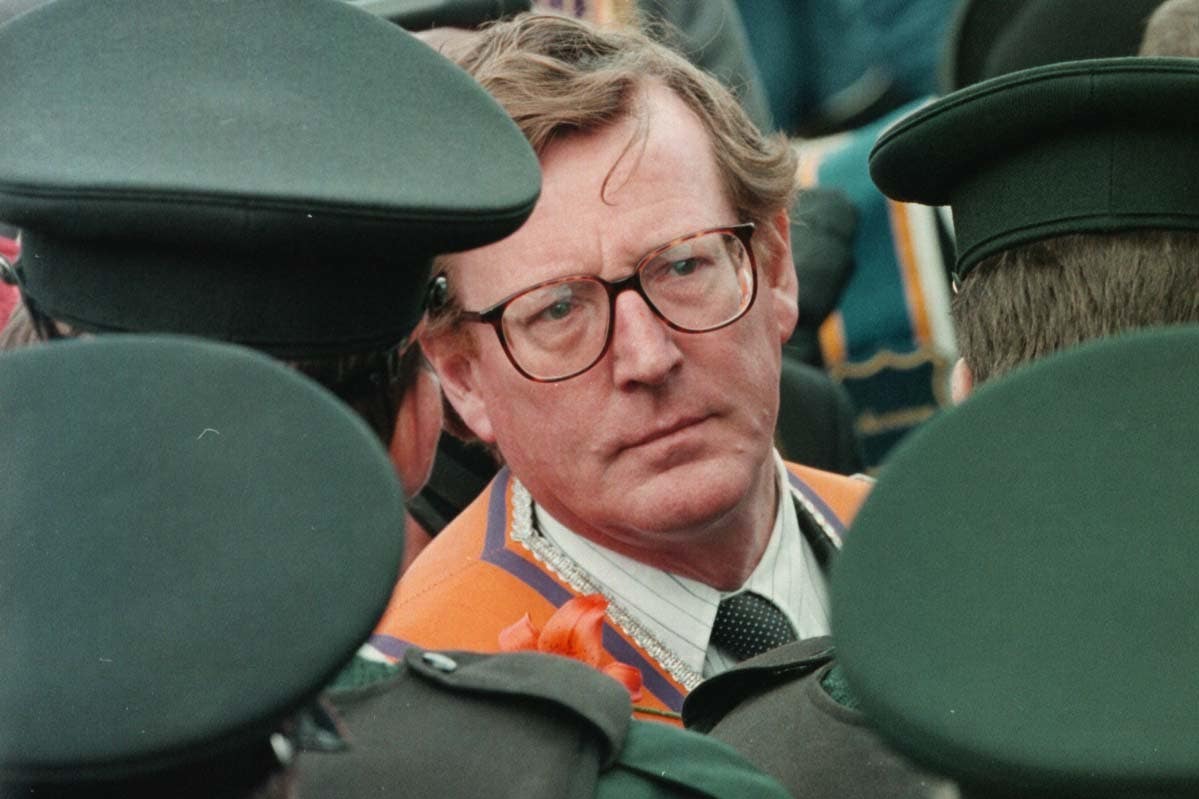New NI police force ‘needed face-saving name’ for Trimble – records
It was noted that ‘the unionists did not want their faces rubbed’ in the fact that there would not be a dual name for the police force.

A new name for a Northern Ireland police force that would supersede the Royal Ulster Constabulary (RUC) needed to be “face saving” for David Trimble, according to newly released files.
State Papers records released this year show various discussions between the British and Irish governments on issues relating to paramilitary decommissioning, prisoner releases and establishing a trusted police force in Northern Ireland.
There are also several references to pressure that Ulster Unionist Party leader David Trimble was under after signing his party up to the Good Friday Agreement in 1998.
At a meeting between Tony Blair and Bertie Ahern at No 10 Downing Street in the summer of 2000, dissidents, demilitarisation and House of Commons facilities for Sinn Fein were discussed.
If David Trimble could not have a face-saving formula on the name we were in real trouble
The meeting took place on July 31 2000, after the initial decommissioning deadline of May 2000 was missed.
The Independent Commission on Policing in Northern Ireland, chaired by Lord Patten, made recommendations that would lead to the RUC transitioning into the Police Service of Northern Ireland (PSNI) in 2001.
During the hour-and-a-half-long meeting, according to notes sent by the Irish ambassador to the UK, Edward Barrington, Mr Blair said that it was important to leave the unionists with something.
It needed to be clear that the “RUC was not the name that was used”, but also that “it was not being erased from history”.
He said that the Chief Constable agreed that there could not be “a dual name”, but “the unionists did not want their faces rubbed in it”, adding that the British and Irish “Governments’ approach needed to be smarter”.
“If David Trimble could not have a face-saving formula on the name we were in real trouble. We needed to help him through the by-election and his party conference and to ensure that he was strong enough to face a general election.”
Mr Trimble said he would “not be rolled over on the Police Bill”.
Mr Ahern said that he had “no sense” that the leaders of nationalism and republicanism were “triumphalist”, and said Gerry Adams “wanted the police reform to work and genuinely wanted a police service that young nationalists could join”.
Deputy First Minister Seamus Mallon also wanted reforms to work, but could not commend a force seen as inadequate and that would make him look “like a Gerry Fitt figure”.
Mr Blair agreed with Mr Ahern’s proposal to have officials focus on “essential points” such as the name, flag, emblem, reserve and Special Branch, and to include “explanatory paragraphs” which would “explain what the legislation actually meant” instead of resolving things through “clever legislative drafting”.
The meeting also came after a “difficult” meeting between Ireland’s then-Foreign Affairs Minister Brian Cowen and UK secretary of state for Northern Ireland Peter Mandelson, on May 26.
In that meeting, Mr Cowen raised concern about aspects of the Policing Bill that had been introduced in the House of Commons, before an opportunity to discuss it.
Mr Mandelson “claimed that Irish officials had signed off on the Bill and on the implementation plan”; the word “wrong” was handwritten next to this paragraph on the archive document.
The note written by the Irish official stated that the Police Bill was discussed initially in the secretariat on May 8 “when we signalled we had problems”.
“In spite of request for a copy of the Bill for consultations it was only given to us on the 15 May when it was introduced in Parliament.”
The material can be viewed in the National Archives in file 2023/154/4
Bookmark popover
Removed from bookmarks